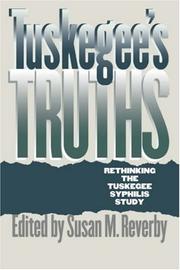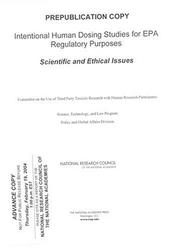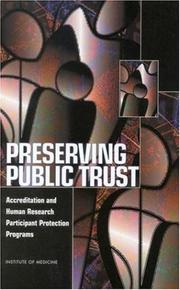| Listing 1 - 10 of 133 | << page >> |
Sort by
|

ISBN: 1469608723 0807848522 9798890872326 Year: 2012 Publisher: The University of North Carolina Press
Abstract | Keywords | Export | Availability | Bookmark
 Loading...
Loading...Choose an application
- Reference Manager
- EndNote
- RefWorks (Direct export to RefWorks)
Between 1932 and 1972, approximately six hundred African American men in Alabama served as unwitting guinea pigs in what is now considered one of the worst examples of arrogance, racism, and duplicity in American medical research--the Tuskegee syphilis study. Told they were being treated for "bad blood," the nearly four hundred men with late-stage syphilis and two hundred disease-free men who served as controls were kept away from appropriate treatment and plied instead with placebos, nursing visits, and the promise of decent burials. Despite the publication of more than a dozen reports in respected medical and public health journals, the study continued for forty years, until extensive media coverage finally brought the experiment to wider public knowledge and forced its end.This edited volume gathers articles, contemporary newspaper accounts, selections from reports and letters, reconsiderations of the study by many of its principal actors, and works of fiction, drama, and poetry to tell the Tuskegee story as never before. Together, these pieces illuminate the ethical issues at play from a remarkable breadth of perspectives and offer an unparalleled look at how the study has been understood over time.
Syphilis --- African Americans --- Alabama --- Human Experimentation In Medicine --- Medical --- Social Science --- History --- African American men --- Human experimentation in medicine

ISBN: 1280176296 9786610176298 0309530989 0309166411 Year: 2004 Publisher: Washington, D.C. : National Academies Press,
Abstract | Keywords | Export | Availability | Bookmark
 Loading...
Loading...Choose an application
- Reference Manager
- EndNote
- RefWorks (Direct export to RefWorks)
Human experimentation in medicine --- Medical ethics. --- Medicine --- Moral and ethical aspects. --- Government policy --- Research --- United States.
Book
ISBN: 0309306698 0309306671 Year: 2014 Publisher: Washington, District of Columbia : National Academies Press,
Abstract | Keywords | Export | Availability | Bookmark
 Loading...
Loading...Choose an application
- Reference Manager
- EndNote
- RefWorks (Direct export to RefWorks)
"In the nearly 40 years since implementation of federal regulations governing the protection of human participants in research, the number of clinical studies has grown exponentially. These studies have become more complex, with multisite trials now common, and there is increasing use of archived biospecimens and related data, including genomics data. In addition, growing emphasis on targeted cancer therapies requires greater collaboration and sharing of research data to ensure that rare patient subsets are adequately represented. Electronic records enable more extensive data collection and mining, but also raise concerns about the potential for inappropriate or unauthorized use of data, bringing patient protections into a new landscape. There are also long-standing concerns about the processes and forms used to obtain informed consent from patients participating in clinical studies. These changes and challenges raise new ethical and practical questions for the oversight of clinical studies, and for protecting patients and their health information in an efficient manner that does not compromise the progress of biomedical research. Contemporary Issues for Protecting Patients in Cancer Research is the summary of a workshop convened by the National Cancer Policy Forum of the Institute of Medicine in February 2014 to explore contemporary issues in human subjects protections as they pertain to cancer research, with the goal of identifying potential relevant policy actions. Clinical researchers, government officials, members of Institutional Review Boards, and patient advocates met to discuss clinical cancer research and oversight. This report examines current regulatory provisions that may not adequately protect patients or may be hindering research, and discusses potential strategies and actions to address those challenges"--
Human experimentation in medicine --- Patients --- Moral and ethical aspects --- Civil rights

ISBN: 1280742321 9786610742325 0309657601 0309101190 Year: 2007 Publisher: Washington, D.C. : National Academies Press,
Abstract | Keywords | Export | Availability | Bookmark
 Loading...
Loading...Choose an application
- Reference Manager
- EndNote
- RefWorks (Direct export to RefWorks)
Human experimentation in medicine. --- Prisoners --- Informed consent (Medical law) --- Medicine --- Legal status, laws, etc. --- Research --- Moral and ethical aspects
Book
ISBN: 9782251430164 2251430164 2251908196 Year: 2007 Publisher: Paris : Les Belles lettres,
Abstract | Keywords | Export | Availability | Bookmark
 Loading...
Loading...Choose an application
- Reference Manager
- EndNote
- RefWorks (Direct export to RefWorks)
Human experimentation in medicine --- Expérimentation humaine en médecine --- History --- Moral and ethical aspects --- Histoire --- Aspect moral --- Expérimentation humaine en médecine --- History, Modern 1601 --- -Investigative Techniques --- Research --- Ethics --- Biomedical Research --- Humanities --- Analytical, Diagnostic and Therapeutic Techniques and Equipment --- Science --- Natural Science Disciplines --- Disciplines and Occupations --- Human Experimentation --- Bioethical Issues --- History, 20th Century --- Human experimentation in medicine - France - History - 20th century --- Human experimentation in medicine - Moral and ethical aspects - France - History - 20th century
Book
ISBN: 9782711772469 2711772462 Year: 2008 Publisher: Paris: Vuibert,
Abstract | Keywords | Export | Availability | Bookmark
 Loading...
Loading...Choose an application
- Reference Manager
- EndNote
- RefWorks (Direct export to RefWorks)
Dix-neuf mois après la Seconde Guerre mondiale est mise en place le 9 décembre 1946 une juridiction internationale à Nuremberg : le Medical Case ou Procès des médecins accusés d'avoir participé au génocide. Au-delà d'une prise de conscience de la nature des actes commis sur les déportés et des dérives induites par une conception dénaturée de la science, les quatre juges du tribunal militaire américain estiment indispensable d'élaborer un code de droit international permettant de qualifier les bonnes pratiques de la recherche menée sur l'homme. Le Code de Nuremberg, adopté en août 1947, repris par la suite dans la Déclaration d'Helsinki, constitue l'acte fondateur de l'éthique médicale moderne. Bruno Halioua a consulté et analysé les archives du procès. Il en retrace le déroulement, les temps forts, les enjeux, et en tire une réflexion approfondie portant sur la bioéthique.
Nuremberg Medical Trial, Nuremberg, Germany, 1946-1947 --- National socialism and medicine --- Human experimentation in medicine --- Medical ethics --- History --- Moral and ethical aspects --- Human experimentation in medicine - Germany - History - 20th century --- Human experimentation in medicine - Moral and ethical aspects - Germany --- Medical ethics - History - 20th century --- Nuremberg, procès des médecins à (1946-1947) --- Expérimentation humaine en médecine --- Éthique médicale national-socialisme et médecine --- Expérimentation thérapeutique humaine --- Éthique des médecins --- Histoire

ISBN: 0309073286 9786610184842 1280184841 0309569915 9780309569910 9780309073288 0309171091 Year: 2001 Publisher: Washington, D.C. National Academy Press
Abstract | Keywords | Export | Availability | Bookmark
 Loading...
Loading...Choose an application
- Reference Manager
- EndNote
- RefWorks (Direct export to RefWorks)
Human experimentation in medicine --- Informed consent (Medical law) --- Standards --- Experimentation on humans, Medical --- Medical experimentation on humans --- Medical ethics --- Medicine --- Medicine, Experimental --- Clinical trials --- Research
Book
ISBN: 0309219299 9786613311962 1283311968 0309219302 9780309219297 9780309219303 0309219329 Year: 2011 Publisher: Washington, D.C. National Academies Press
Abstract | Keywords | Export | Availability | Bookmark
 Loading...
Loading...Choose an application
- Reference Manager
- EndNote
- RefWorks (Direct export to RefWorks)
Clinical trials provide essential information needed to turn basic medical research findings into patient treatments. New treatments must be studied in large numbers of humans to find out whether they are effective and to assess any harm that may arise from treatment. There is growing recognition among many stakeholders that the U.S. clinical trials enterprise is unable to keep pace with the national demand for research results. The IOM, along with the Mount Sinai School of Medicine, held a workshop June 27-28, 2011, to engage stakeholders and experts in a discussion about possible solutions to improve public engagement in clinical trials.
Clinical trials. --- Controlled clinical trials --- Patient trials of new treatments --- Randomized clinical trials --- Trials, Clinical --- Clinical medicine --- Human experimentation in medicine --- Research
Book
ISBN: 030944358X 0309443601 Year: 2016 Publisher: Washington, DC : The National Academies Press,
Abstract | Keywords | Export | Availability | Bookmark
 Loading...
Loading...Choose an application
- Reference Manager
- EndNote
- RefWorks (Direct export to RefWorks)
Clinical trials --- Minorities --- Women --- Controlled clinical trials --- Patient trials of new treatments --- Randomized clinical trials --- Trials, Clinical --- Clinical medicine --- Human experimentation in medicine --- Research
Book
ISBN: 0128162430 0128162422 9780128162439 9780128162422 Year: 2018 Publisher: London, United Kingdom : Academic Press,
Abstract | Keywords | Export | Availability | Bookmark
 Loading...
Loading...Choose an application
- Reference Manager
- EndNote
- RefWorks (Direct export to RefWorks)
Clinical trials. --- Controlled clinical trials --- Patient trials of new treatments --- Randomized clinical trials --- Trials, Clinical --- Clinical medicine --- Human experimentation in medicine --- Research
| Listing 1 - 10 of 133 | << page >> |
Sort by
|

 Search
Search Feedback
Feedback About UniCat
About UniCat  Help
Help News
News